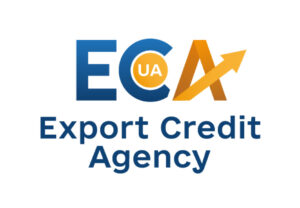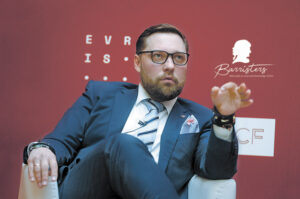
The Export Credit Agency (ECA) has received a certificate of compliance with the international standard ISO 37001:2016 — the Anti-Bribery Management System standard, according to the ECA website.
In addition, it is noted that ISO 37001:2016 is a globally recognized standard that defines the requirements for the development and operation of systemic mechanisms for preventing, detecting, and responding to bribery risks. It applies to organizations of any form of ownership and scale and covers both internal processes and interactions with contractors, partners, and intermediaries.
ISO 37001:2016 certification confirms that EKA has implemented and is effectively operating an anti-bribery management system that meets international requirements and has been independently assessed by an external certification body. The audit covered not only the existence of policies and procedures, but also their implementation, internal control, accountability, and response mechanisms.
“For international partners, financial institutions, and businesses, ISO 37001:2016 certification confirms that ECA’s activities are based on the principles of integrity, transparency, and good governance, and that its internal processes are designed in line with the best global practices in anti-corruption compliance,” the statement said.
The Export Credit Agency of Ukraine (ECA) is a state institution that supports non-commodity exports by insuring the risks of enterprises and banks. The agency insures foreign economic contracts, export credits, bank guarantees, and investment loans against military risks.

Romanian law enforcement agencies have detained former senator Marius Ovidiu Isele on suspicion of attempting to bribe Defense Minister Ionut Mosatan with €1 million to facilitate an ammunition deal. According to investigators, the scheme involved purchasing Soviet-style shells in Kazakhstan, importing them, and “rebranding” them in Romania, then selling them through an intermediary in Bulgaria for delivery to Ukraine. This was reported by Radio Liberty, citing investigation materials and participants in the events.
The head of the state-owned company Romtehnica, Razvan Minku, said that he had been approached with a proposal to use his contacts in Kazakhstan to resell ammunition, but he considered the proposal suspicious and refused. The intermediary was politician Octavian Bercian, who contacted law enforcement agencies and made 17 hidden recordings of meetings with Isele. The court imposed a preventive measure on the former senator in the form of 30 days of pre-trial detention.
There are also reports about Bulgarian businessman Roman Ivanov Angelov, the sole owner of Sofia Arm Tech, which received a license for international arms trade in 2024. His whereabouts are unknown, and he has not responded to journalists’ inquiries. The defense minister stated on social media that he had refused any meetings and that the attempt to “buy his influence” had been rejected.
The publication notes that the initiators hoped to attract funds from the European Rearm Europe program to support the defense industry of EU countries in the future, but the scheme remained at the trial stage and was not implemented.
Rearm Europe was launched by the European Commission in March 2025 to stimulate arms production in EU countries. Romtehnica is the authorized intermediary of the Romanian Ministry of Defense for international procurement and sales of arms and military equipment.

Invitation by the Organization for Economic Cooperation and Development (OECD) Working Group on combating bribery in Ukraine to join the Convention on Combating Bribery of Foreign Public Officials in International Business Transactions and become a full member of the relevant Working Group is recognition of the fact that Ukraine is clearly choosing a course of action to raise standards of transparency, accountability, and integrity in the interaction between business, civil society, and government.
This opinion was expressed to the Interfax-Ukraine agency by Oleksiy Shevchuk, chairman of the board of the National Association of Lobbyists of Ukraine.
“For us, as a professional community of lobbyists, the request from the Organization for Economic Cooperation and Development is an important signal: the state is clearly choosing a course of action to raise standards of transparency, accountability, and integrity in the interaction between business, civil society, and government,” he said.
Shevchuk noted that “in this context, the Association of Lobbyists of Ukraine believes that business, lobbyists, and state institutions should use this combination of two reforms—anti-corruption and lobbying—as an opportunity.”
According to Shevchuk, this refers, in particular, to the opportunity to create standards of professional ethics and conduct in the field of lobbying that will meet both the requirements of the law and the expectations of international partners, as well as the opportunity to review the internal policies of companies, “especially those operating abroad or in an international context, for compliance with the requirements of the Organization for Economic Cooperation and Development regarding the bribery of foreign officials.”
In addition, according to Shevchuk, such accession will “contribute to the new lobbying system becoming not only a platform for interests, but also a guarantor of good faith participation in state-building processes, creating trust in Ukraine among investors and international partners.”
“We believe that these changes should transform from a formal approach into an effective practical tool, and the Association is ready to facilitate training, code development, consultation, and monitoring. For Ukraine, this is a chance to increase competitiveness and demonstrate that we are capable of acting in accordance with the best international practices,” he said.
As reported, the Organization for Economic Cooperation and Development (OECD) Working Group on Bribery invited Ukraine to join the Convention on Combating Bribery of Foreign Public Officials in International Business Transactions and become a full member of the relevant Working Group. The basis for this process was draft law No. 11443, prepared by the parliamentary committee on law enforcement, on improving mechanisms for holding legal entities accountable for bribing foreign officials. In particular, the draft law provides for the possibility of applying special confiscation on the basis of a court decision to apply criminal law measures to a legal entity. According to the draft law, additional (non-financial) criminal law measures may be applied to a legal entity in the form of a temporary restriction on the activities of the legal entity or a temporary restriction on the acquisition of rights and/or benefits. The draft law also provides for an increase in the amount of fines imposed on legal entities as the main criminal law measure.